Acala & Karura Set for a Historical First
A week after Gavin Wood’s announcement with an established timeline for the Kusama Parachain Auctions, we’ve seen a great deal of support push Karura towards the top of the list in terms of KSM raised from the community, including retail and institutional investors locking up their KSM in order to accomplish the parachain slot that would allow Karura to begin working on the Kusama mainnet.
At the moment of writing, Karura has roughly 13,000 participants that have contributed over 440,000 KSM locked (more or less $159 million), meaning Karura accounts for over 60% of all KSM locked in search for the first parachain slot in the Kusama Parachain Auctions, with the closest contender accumulating approximately 99,000 KSM locked.
Acala & Karura: A DeFi Hub
Acala is the all-in-one DeFi hub of Polkadot. It is also an Ethereum-compatible platform for financial applications to use smart contracts or built-in protocols with out-of-the-box cross-chain capabilities and robust security. The platform also offers a suite of financial applications including a trustless staking derivative (liquid DOT), a multi-collateralized stablecoin backed by cross-chain assets (aUSD), and an AMM DEX, all counting with considerably small gas fees that can be paid in any token.
Acala is set to be one of the most in-demand platforms for the upcoming Polkadot Parachain Auctions due to its clear use case and valuable features that will certainly be a high-quality addition to the Polkadot ecosystem while attracting an ever-growing stream of users from different corners in and out of blockchain.
Additionally, the same top-notch team that has brought to life Acala, has also established a similar platform that aims to be developed on Polkadot’s canary network, Kusama. Karura is a scalable, EVM-compatible network optimized for DeFi. The platform offers the same suite of financial applications mentioned above for Acala, with the distinction that it will work with liquid KSM and a multicollateral stablecoin (kUSD).
Karura, the Top Contender for the First Kusama Parachain Slot
Karura, as a DeFi Hub, is part of a larger narrative that positions similar solutions to be an innovative and disruptive platform that will bring the new era of banking to millions of unbanked around the world, while improving costs and offering a “suite of financial applications” for a market worth over $20 trillion.
This is a clear indicator of why Karura at the moment has a clear lead over highly valuable solutions in other sectors of the Polkadot ecosystem, setting up the stage for an initial best of five race, where crowdloan participants will be the key for each project to demonstrate their value and potential to boost the young blockchain space into overdrive under the Polkadot and Kusama umbrella.
To participate in this crowdloan, there are three ways to support Karura. You can join via their website, by staking your KSM tokens directly on exchanges such as Kraken, OKEx, or KuCoin, and finally via mobile wallets such as Polkawallet, Math Wallet, or Fearless Wallet. Once the tokens have been locked, they will be held for a 48 week period and in return 12 KAR (Karura native token) will be distributed, per each 1 KSM locked, to participants that have assisted the Acala/Karura team in this endeavor.
Why is DFG supporting Acala & Karura?
Digital Finance Group (DFG) has been heavily invested in Polkadot since 2018 and subsequently in the development of Polkadot as an ecosystem, through its $20 million Polkadot Eco Fund, which promises to push the boundaries of scalable DApp development thanks to its parachain system.
Among these promising investments, Polkadot native Acala and its sister, Kusama native, Karura, are among the top projects that deliver detailed solutions for the future of DeFi through an all-in-one platform that will enable users to access staking derivatives, sophisticated multicollateral stablecoins, and an AMM DEX.
Furthermore, one of the most important characteristics DFG observes when supporting any project within blockchain, is the team, and the Acala team led by Ruitao Su, Bette Chen, Fuyao Jiang, and Bryan Chen, with years of experience and successful platforms such as Laminar and Polka Wallet among their creations, is a clear indicator of what this specific team can accomplish.
The high intellectual level of this team has also been recognized by the Web3 Foundation which has successfully assigned grants to this team on several occasions and by one of the leading FinTech companies in the US, Current, with whom Acala has created a valuable partnership to promote the creation of a hybrid finance model on the Current core platform.
DFG believes that the high demand for parachain slots will initially give room to the most important projects that aim to set up the foundations for a highly promising network of DApps, such as Acala and Karura, that will change the landscape of blockchain and DeFi as we have come to know it.
